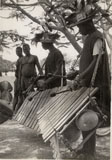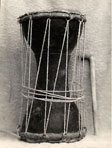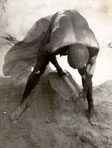The Music of Place
The first time I realized that each place has a different music, I was sitting in my house in Sirasso, a traditional agrarian village in the northern Ivory Coast. Two elders visiting us were conversing in Senufo, the local language, and I did not understand a word. The advantage of not understanding is that you listen to the sound of the language, not the meaning. Outside in the courtyard a band of very excited guinea hens were jamming. From the village came the rhythm of women preparing the evening meal, pounding rice or yams in large wooden mortars.
Sometimes a young man would come to our house and play his kora, a traditional harp made from gourd, hide and wood [1] . At celebrations the balafons and drums [2] would call the villagers to dance and continue throughout the night. When the initiates graduated from their seven years of service in the men’s society, they went through the village for weeks playing talking drums [3], recounting tales and trials, and praising the ancestors, chiefs, and traditions. When fields were hand cultivated, the dabas [4] cut the earth with energetic rhythms, as griots [5] sang praises for the work of the strong young men dancing as they moved earth for planting.
Since then, I have felt when speaking different languages and listening to world music, that a place is evoked through the sounds that reside there. In the case of human language and music, it is the sound of the place that makes the tones, rhythms and melodies as people communicate feelings and thoughts associated with their life in their habitat. When I speak French, Spanish, Bamana or Dutch, I feel physically and emotionally different, and am flooded with memories and their associations. The music of the language transports me, and the experiences, images, smells and people come alive in my consciousness.
Ethnobiologist Gary Nabhan takes this relationship between place and the people who live there to its next level in his book Cultures and Habitat where he writes:
The analogy between biodiversity and language complexity is apt, for both are wellsprings of information. Both percolate with the time-tried wisdom of ways to live well in this world, ways that are now being sucked out of existence. In fact, some of the very same forces are destroying habitats, extinguishing species, and forcing languages out of use. While biologists have been writing epitaphs for species, linguists have been doing the same for the indigenous languages left on the planet. (G. Nabhan, Cultures and Habitat, p.20-21) [6]
If you think of language and place as sharing the same music, it is logical that a language and a culture will disappear when the plants and animals that provide the musical context for the culture disappear. The implications of this to human happiness, identity and wisdom are grave. When a place dies, humanity loses music, and human experience becomes more dull, monotonous and poor on many levels. Wishing for the preservation of wild places and the indigenous people who live there, is not simply a feeling of nostalgia. When an environment, a people, and a language are lost, humanity loses a storehouse of knowledge, a way of viewing the universe, a viewpoint of truth, a wisdom of human existence, and the notes of sacred and celebratory songs.
Reflecting on the music of language and place, I wrote the following poem in 2007:
Hush and Listen
Hush and listen to the music
of the foreign tongue.
Do you hear
the waves breaking on the shore,
the clapping of the women preparing bread,
the frigid wind upon the plains,
the brittle dry of scarcity,
the howling of beasts,
the calls of birds?
Do you hear
bare feet on forest trails,
water rushing over rocks,
insects calling in the night?
Do you hear
rhythms of hoe cutting earth,
rhythms of pestles pounding grains in hollowed trunks,
rhythms of oars against the water,
rhythms of hooves on mountain paths,
rhythms of sobbing years,
rhythms of laughter and cheer?
Do you hear
complaints of toil against the odds
waiting in perpetual fear,
twang of monotonous days?
Do you hear
the scent of history,
the taste of food cooked in earthenware,
the fire of celebrations,
the footprints of wanderers searching new homes.
the hopeful tale
the disappointed shrug?
Hush and listen to the music
of the foreign tongue.
Not only do people have music, but also nature and inanimate beings — rocks, water and soil. When relationships are in harmony, their music creates healthy life. Gifted musicians can hear the music of nature. We are healed in nature even unconsciously, so being out in nature, gardening, or simply observing, are healing activities. When you contemplate the stars, the sunset, feel the wind and smell the rain, appreciate insects and birds, you are tuning in with the music of nature and adjusting your instrument so that it can be receptive to that energy and then infuse your life with it. Even when you are silent your music plays and affects others. We recieve gifts from people and nature because we are receptive, not because they are given to us.
Listening to a wide range of ethnic music and different singers and instruments, I hear so many life experiences, so many geographical environments, and so many different moods. It is insightful to compare urban music with folk music from less developed nations. Music can connect us to our humanness. Ultimately we create our life by the “music” we listen to and to which we tune our “instruments.”
© 2010 Richard
V. Sidy
Richard served as a Peace Corps Volunteer in the village of Sirasso in the northern Côte d’Ivoire from January 1969 to May 1971. He lived with the Senufo, a traditional agrarian people who were practicing animists. The Dyula (merchant class and weavers), and the Fulani (nomadic herders), both of whom practiced Islam, were also a part of the Sirasso community.
NOTES:
[1] See, hear, and learn more about the kora and other west African instruments. http://www.kora-music.com/e/frame.htm
[2]
Balafons |
[3]
Talking Drum |
[4]
Digging with a daba
|
photos © 2010 Richard Sidy
[5]Learn about the west African Griot http://en.wikipedia.org/wiki/Griot
[6] Gary Nabhan is a unique scholar in sustainable environments because of his understanding and compassion for the human element. He views the quality of human life and need to care for the environment as inseparable. His broad cultural and personal experiences give his work the voice of authenticity and historical continuity that show us our roots in the natural world. Nabhan's books and stories recount a discovery of kinship with all food traditions of the human experience. Visit http://www.garynabhan.com to find out more about his ecologically humane work.
return to top
Read
Related Articles on SNS Press
Read
Related Poems
|




